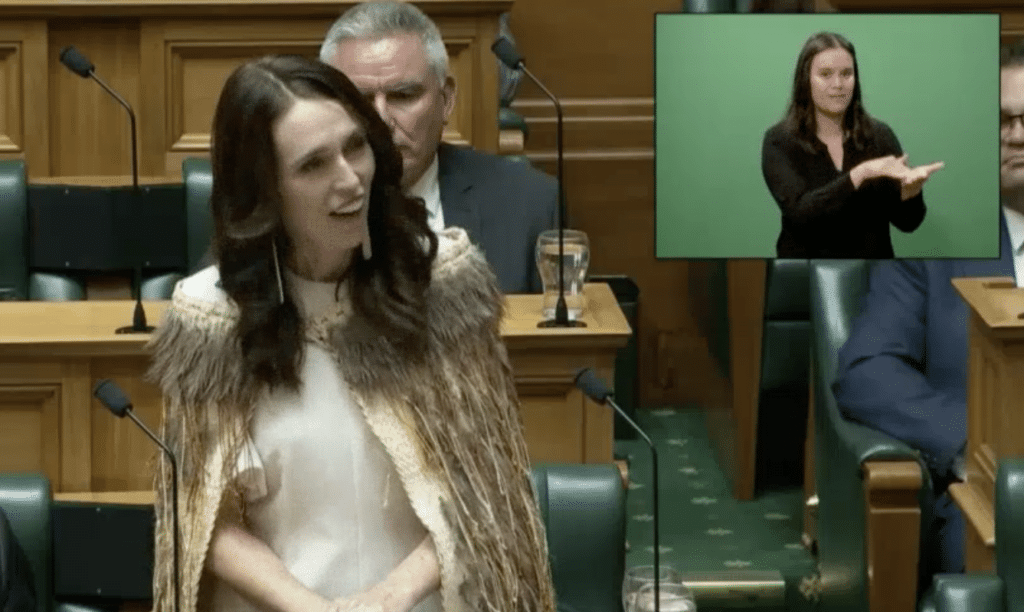Former New Zealand Prime Minister had every right to share the achievements she and her party has made during her time as leader.
But it was her comment that, “I didn’t always get it right” that was so humbling, and so different from the typical valedictory speeches heard in parliaments across the world.
And it was her comments about the support she had as a mother, highlighting her daughter’s “village” as well as the work her team put in to ensuring Ardern made it home for book time, that also reminded us that this was a different kind of leader.
It was her plea to remove politics from the crises we face, such as on climate change.
And it was her admission that the role of prime minister was “never a role she thought she’d have”. So much so, that she recalled waking up on a plane shortly after she became PM and asking the person in the seat beside her, “Am I still leader of the Labour party?”
Most of all, the differences in leadership Ardern demonstrated was in the fact she was actually leaving the position at all. As she declared back in January on making the surprise announcement that she would be stepping down as leader of the Labour party, “a good leader knows when it’s time to go.”
Ardern, at the time, said she didn’t have enough “left in the tank” to do the role justice. “It’s about knowing when you’ve got what it takes and what is needed to lead, but also have the courage to know when you don’t,” she said.
Wearing a Maori cloak while giving her final speech on Wednesday, her final day of parliament, Ardern was emotional and compassionate. She was funny and warm. And she clearly went in with a purpose: to highlight the opportunities for everyone in politics and the difference that can be made with time in office.
“I’ve always believed this to be a place where you can make a difference. I leave knowing that to be true,” she said.
She noted that her time as prime minister was and will likely be defined by three key things she never imagined she’d be addressing: a terrorist attack, a volcanic eruption and a pandemic.
But that’s leadership. That’s what’s required in any top job, including as a prime minister.
The empathy she showed during the role, particularly witnessed in the aftermath of the attack on two Mosques in Christchurch, came to define much of how people saw her leadership.
And that empathy continues with her today. She said that it was events like Christchurch and also the White Island Volcanic eruption that saw her coming face to face with tragedy.
“I found myself in people’s lives during their most grief-stricken or traumatic moments. Their stories and faces remain etched in my mind, and likely will forever. That is the responsibility and privilege of the role of prime minister,” she said.
Ardern said through it all, she has still personally been able to be the mother she wanted to be.
“There is no question I’ve had incredible support to be the mother I wanted to be, from the office team who tried to get me home for story time, and Neve’s village who were there when I couldn’t be present. I leave knowing that I was the best mother I could be. You can be that person and you can be here.”
“I do hope that I have demonstrated something else entirely. That you can be anxious, sensitive, kind and wear your heart on your sleeve. You can be a mother or not. You can be an ex morman or not. You can be a nerd, a hugger a crier. You can be all these things and not only can you be here. You can lead just like me.”
On the response to COVID-19, she said it gave her “sit down moments” and highlighted that it was a tough experience for the nation and for her personally. She conceded that “sometimes we didn’t get it right.
And on climate change, she pleaded for more to be done, especially for the politics to be taken out of climate change, just as it should be taken out of every crisis.
“When I came here 15 years ago, we talked about climate change as if it was almost hypothetical. Some didn’t even give it that credit.
“I know there is politics in almost everything. This chamber understands why more than anyone. But we also know when and how to remove it. When the crisis has landed in front of us, I have seen the best of this place … and climate change is a crisis. It is upon us and so one of the very few things I will ask of this house on my departure is you please take the politics out of climate change.”
Prior to making the speech, Ardern shared with media some of what she’ll be doing in her post-political career life — highlighting appointments that again speak to her clear interest in legacy.
One such role will include continuing her work addressing online extremism by working with governments and tech companies on The Christchurch Call, an entity she founded after the Christchurch massacre that saw a lone white supremacist gunman attacking two mosques.
She told media on Tuesday, she still felt a “sense of duty” to the victims of the Christchurch massacre.
Ardern served as New Zealand’s 40th Prime Minister, and third female prime minister. She joined parliament as an MP in 2008 at the age of just 28. She leaves at the age of just 42.


